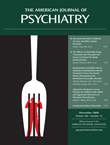Improving Verbal Memory Performance in Schizophrenia
To the Editor: It is with great interest that we read the article by Melissa Fisher, Ph.D., et al. (1) , published in the July 2009 issue of the Journal , on a neuroplasticity-based auditory training to improve verbal memory in schizophrenia. Dr. Fisher et al. rightly stated that a new approach to the treatment of cognitive dysfunction in schizophrenia is needed. The authors used conventional psychological tests in several cognitive domains to examine whether their approach was successful and found a significant improvement from baseline to post-computerized auditory training in verbal working memory, verbal learning, verbal memory, and global cognition among those subjects who received the training.
These interim results are indeed fascinating. However, two critical notes are important. First, there was a difference in the number of female subjects between the treatment and comparison groups (nine versus six), which could have influenced the results substantially, especially since the groups were rather small. There is extensive literature showing that women outperform men in the language (verbal) domains and that these sex differences can also be seen in patients with schizophrenia (2) . Consequently, we cannot be sure whether significant improvements on tasks with a clear verbal element would also be observed when the number of female subjects in the treatment and comparison groups remains constant. In particular, when we keep in mind that this training focused specifically on speech, then it might be expected (given the data presented in the available literature) that women improved more than men.
In addition, there appears to have been a substantial difference between the two groups regarding the dose of antipsychotic medication, with the comparison group receiving higher doses. This too could have influenced the results (3) , and, therefore, these results should be interpreted cautiously. Finally, we completely agree with the authors that neuroplasticity-based auditory training is an important direction in the treatment of patients with schizophrenia, and we look forward to seeing future results on their training program.
1. Fisher M, Holland C, Merzenich MM, Vinogradov S: Using neuroplasticity-based auditory training to improve verbal memory in schizophrenia. Am J Psychiatry 2009; 166:805–811Google Scholar
2. Walder DJ, Seidman LJ, Cullen N, Su J, Tsuang MT, Goldstein JM: Sex differences in language dysfunction in schizophrenia. Am J Psychiatry 2006; 163:470–477Google Scholar
3. Brébion G, Bressan RA, Amador X, Malaspina D, Gorman JM: Medications and verbal memory impairment in schizophrenia: the role of anticholinergic drugs. Psychol Med 2004; 34:369–374Google Scholar



